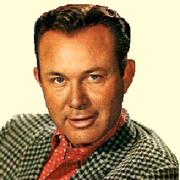Jim Reeves
James Travis "Jim" Reeves (August 20, 1923 – July 31, 1964) was an American country and popular music singer-songwriter. With records charting from the 1950s to the 1980s, he became well known as a practitioner of the Nashville sound (a mixture of older country-style music with elements of popular music). Known as "Gentleman Jim", his songs continued to chart for years after his death. Reeves died at age 40 in the crash of a private airplane. He is a member of both the Country Music and Texas Country Music Halls of Fame. 被称为绅士的吉姆.里夫斯,可能是纳须尔冒出来最大的一位男星。他那甜美的男中音加上柔和的管弦乐伴奏,至今还在世界各地回响。里夫斯本来擅长演唱硬派乡村歌曲(1953年的一曲《Mexican Joe》曾列榜首),但给人印象最深的还是他那乡村-流行哼唱的歌喉。他在1955-1969年,不断在乡村和流行排行榜上出现。1964年里夫斯死于飞机失事,实在很不是时候。他不仅是美国排行榜上风云人物,还是乡村音乐早期的国际性大使。值得一提是,他在英国乃至欧洲的名声,远比在美国本土的要响亮。在他过世之后,他的歌迷基础一点都没有缩小。他死后发行的数支热门曲,销量甚至比他生前的单曲还多。在他安葬后的三年中,不下6支单曲进入排行榜首。实际上,他和Deborah Allen合唱的,生前未发表的《Take Me In Your Arms and Hold me 》以及和1963年也死于飞机事故的Patsy Cline的合唱,并以电声伴奏的《Have You Ever Been Lonely》,在上世纪70年代和80年代仍成为了热门歌曲。但他的遗赠,如1957的年一首特别有味的乡村 - 流行单曲《Four Walls》及1959年的《He’ll Have To Go》都显现了他本人及整个乡村音乐的风格。吉姆.里夫斯是在德州的Galloway出生并成长的,是家中的九个孩子之一。不幸的是,他才10个月父亲就去世了,母亲为了维持一家生活在农场工作。5岁时他得到一把吉它,之后又在他哥哥处听到了一张Jimmie Rodgers的唱片。自此他便迷上了乡村音乐,当然特别对Jimmie Rodgers 感兴趣。12岁时,他就在路易斯安那州Shreveport的无线电节目中露脸。虽然他是个音乐迷,却也有着运动员的天赋,青年时险些成为棒球运动员。在赢得德克萨斯大学的体肓奖学金后,里夫斯选择了学习演说和戏剧,但只读了6个星期便离校到休士顿的船坞去工作了。1944年在加入圣路易斯天主教唱诗班前,他又回到了棒球场任半职业性的棒球运动员,打了3年,直到他脚踝严重受损而不得不放弃他运动员的生涯。之后的数年中,里夫斯从事了好几项蓝领工作。这期间,他开始成为业余歌手。除了独唱外,还成了Moon Mullican乐队的挂名负责人。1949年里夫斯在一家小型独立的Macy唱片公司录了几支歌曲,没有什么成功之作。50年代初里夫斯决定从事广播事业,随即便到德克萨斯Gladewater的KSIG电台工作,后又转到Henderson的LGRI电台去寻求发展。在这几年里,他在KGRI电台中任唱片播音员兼新闻广播员。1952年11月又转到了Shreveport的KWKH电台,成了该台热门节目Louisiana Hayride的主持人。1952年底,他在一次顶替没能出席某栏节目的Hank Williams进行演唱后,被听众热情的接纳了。Abbott唱片公司便立即和他签订了一纸录音合同,录的第一支歌曲便是《Mexican Joe》。此曲于1953年春迅速爬升排行榜首,停留了9周,跟着还是在1953年,他又录出了另一支热门曲《Bimbo》。在1953年底,他成为Louisiana Hayride节目中的固定演员。在1954年和1955年,他为Abbott公司及他的母公司Fabor唱片公司又录出了4支热门曲。这一系列的成功,说明了他不是一位一闪即逝的音乐人。1955年,RCA唱片公司和他签了个长期合同,同年他还加入了Grand Ole Opry。在RCA公司的时候 ,里夫斯开始开发他那与众不同的,柔和醉人而流行化的乡村风格。这令他成为一位超级明星,同时又赢得了吉姆神士的外号。1955年夏,他在RCA录制的第一支进入前10位的歌曲《Yonder Comes as Sucker》达到了乡村排行榜第4位,跟着便是一连串进入前40位的歌曲,而且大多数都进入了前10位。许多他的单曲都跨界进入流行歌曲排行榜,说明里夫斯的歌曲深受流行曲的影响。其实他的演唱风格有不少是从Frank Sinatra和Bing Crosby的哼唱法中继承过来的。由于他成功的将乡村歌曲流行化,使得乡村音乐又有了一批新的都市听众。 在上世纪50年代和60年代初,里夫斯唱出众多有份量的热门曲及乡村经典,有如《Four Walls》(1957且登榜首8周),《Anna Marie》(1958),《Blue Boy》(1958第二位),《Billy Bayou》(1959年榜首5周),《He’ll Have to Go》(1960年榜首14周),《Adios Amigo》(1962年第2位)《Welcome to My World》(1964年第2位),《I Guess I’m Crazy》(1964年榜首7周)。《Four Walls》是他演艺生涯中的转折点。里夫斯本人及其制作人Chet Atkins都意识到叙事型歌曲才是他们成功的源泉。这一结果,也令里夫斯成为耀眼的一颗明星,这还不仅是在美国,而是全世界。里夫斯巡回欧洲,南非,建立了一支过去几乎对乡村音乐封闭的追随者。他对美国乡村音乐国际化,做出了重要的贡献。1964年7月31日,吉姆.里夫斯趁坐的私人飞机在纳须维尔郊外失事时,他的事业正如日中天。他和他经理人Dean Manuel的尸体两天后被发现,葬于他德州家乡。里夫斯虽然死了,他的受众群并未消失。他的唱片销售量在他死后反而增长了。在整个60年代后期,RCA唱片公司发行了一系列他的遗腹单曲。其中有多曲到达了排行榜首,包括《This Is It》(1965),《Is It Really Over?》(1965),《Distant Drums》(1966),《I Won Come In While He There》(1967)等。后来出的专辑,经常都将他生前及逝世后发行的歌曲混在一起出版发行。虽搅乱了他的目录。但却使RCA公司获益。到70年代或80年代,那股出版他生前未发行歌曲的浪潮一直都没有停顿。实际上,由1970年1984年的排行榜中,每年都有里夫斯的单曲上榜。里夫斯1967年被列入乡村音乐名人堂。两年后乡村音乐协会设立了吉姆.里夫斯纪念奖。虽然他的遗腹歌曲潮在80年代中期停止了,对吉姆.里夫斯的敬仰却并未哀竭。在90年代Bear Family公司发行了一套16张光盘的 Welcome to My World 囊括了他的全部录音作品。by David VinopalGentleman Jim Reeves was perhaps the biggest male star to emerge from the Nashville sound. His mellow baritone voice and muted velvet orchestration combined to create a sound that echoed around his world and has lasted to this day. Detractors will call the sound country-pop (or plain pop), but none can argue against the large audience that loves this music. Reeves was capable of singing hard country (Mexican Joe went to number one in 1953), but he made his greatest impact as a country-pop crooner. From 1955 through 1969, Reeves was consistently in the country and pop charts an amazing fact in light of his untimely death in an airplane accident in 1964. Not only was he a presence in the American charts, but he became country musics foremost international ambassador and, if anything, was even more popular in Europe and Britain than in his native America. After his death, his fan base didnt diminish at all, and several of his posthumous hits actually outsold his earlier singles; no less than six number one singles arrived in the three years following his burial. In fact, during the 70s and 80s, he continued to have hits with both unreleased material and electronic duets like Take Me in Your Arms and Hold Me with Deborah Allen and Have You Ever Been Lonely? with his smooth-singing female counterpart of the plush Nashville sound, Patsy Cline, who also perished in an airplane crash, in 1963. But Reeves legacy remains with lush country-pop singles like Four Walls (1957) and Hell Have to Go (1959), which defined both his style and an entire era of country music.Reeves was born and raised in Galloway, TX, where he was one of nine children. Tragically, his father died when Jim was only ten months old, forcing his mother to farm and raise her family. At the age of five, he was given an old guitar, and shortly afterward, he heard a Jimmie Rodgers record through his older brother. From that moment on, Reeves was entranced by country music and Rodgers in particular. By the time he was 12 years old, he had already appeared on a radio show in Shreveport, LA. Though he was fascinated with music, Reeves also was a talented athlete and during his teens he decided he was going to pursue a career as a baseball player. Winning an athletic scholarship to the University of Texas, Reeves enrolled at the school to study speech and drama, but he dropped out after six weeks to work at the shipyards in Houston. Soon, he had returned to baseball, playing in the semiprofessional leagues before signing with the St. Louis Cardinals in 1944. He stayed with the team for three years before seriously injuring his ankle and thereby ruining his chances of a prolonged athletic career.For the next few years, Reeves went through a number of blue-collar jobs while trying to decide on a profession. During this time he began singing as an amateur, appearing both as a solo artist and as the frontman for Moon Mullicans band. In 1949, Reeves cut a number of songs for the small independent Macy label, none of which were particularly successful. In the early 50s, Reeves decided that he would make broadcasting his vocation, initially working for KSIG in Gladewater, TX, before establishing himself at KGRI in Henderson. Over the next few years, Reeves was a disc jockey and newscaster at KGRI, moving to KWKH in Shreveport, LA, in November of 1952, becoming host of the popular Louisiana Hayride. Late in 1952, Hank Williams failed to make an appearance on the show, and Reeves sang in his place. His performance was enthusiastically received, and Abbott Records immediately signed him to a record contract. Mexican Joe was Reeves debut single for Abbott, and it quickly climbed to number one in the spring of 1953, spending nine weeks at the top of the charts. It was followed by another number one hit, Bimbo, later in 1953, establishing that Reeves was not a one-hit wonder; later that same year, he was made a full-time member of the Louisiana Hayride. During 1954 and 1955, he had four other hit singles for Abbott and its parent company, Fabor, before RCA signed him to a long-term deal in 1955; that same year, he joined the Grand Ole Opry. At RCA, Reeves began to develop the distinctively smooth, lush, and pop-oriented style of country that made him a superstar and earned him the nickname Gentleman Jim. Peaking at number four, Yonder Comes a Sucker was his first Top Ten hit for RCA in the summer of 1955. It kicked off a remarkable streak of 40 hit singles, most of which charted in the Top Ten. Many of his singles also became pop crossovers, which indicates exactly how much of a pop influence there was on his music. Indeed, Reeves vocal style derived from the crooning of Frank Sinatra and Bing Crosby, and early in his career he abandoned cowboy outfits for upscale suits. In the process, he brought country music to a new, urban audience.Throughout the 50s and early 60s, Reeves racked up a number of major hits and country classics like Four Walls (number one for eight weeks, 1957), Anna Marie (1958), Blue Boy (number two, 1958), Billy Bayou (number one for five weeks, 1959), Hell Have to Go (number one for 14 weeks, 1960), Adios Amigo (number two, 1962), Welcome to My World (number two, 1964), and I Guess Im Crazy (number one for seven weeks, 1964). Four Walls was the turning point in his career, proving to both Reeves himself and his producer, Chet Atkins, that his main source of success would come from ballads. As a result, Reeves became an even bigger star, not only in America but throughout the world. Reeves toured Europe and South Africa, building a strong following in countries that rarely had been open to country music in the past.Reeves was at the height of his career when his private plane crashed outside of Nashville on July 31, 1964. The bodies of Reeves and his manager, Dean Manuel, were found two days later and were buried in his homestate of Texas. Though Reeves had died, his popularity did not vanish — in fact, his sales increased following his death. Throughout the late 60s, RCA released a series of posthumous singles, many of which — including This Is It (1965), Is It Really Over? (1965), Distant Drums (1966), and I Wont Come in While Hes There (1967) — hit number one. The previously unissued songs were frequently mixed in with previously released material on album releases, making his catalog confusing but profitable for RCA. The flow of unreleased Reeves material did not cease during the 70s or 80s — in fact, there wasnt a year between 1970 and 1984 when there wasnt a Reeves single in the charts, either at the top or in the lower regions. Reeves was inducted into the Country Music Hall of Fame in 1967, and two years later, the Academy of Country Music instituted the Jim Reeves Memorial Award. Though the flood of unreleased material ceased in the mid-80s, the cult surrounding Reeves never declined, and in the 90s, Bear Family released Welcome to My World, a 16-disc box set containing his entire recorded works.


 Losing Your Love - Jim Reeves
Losing Your Love - Jim Reeves
























